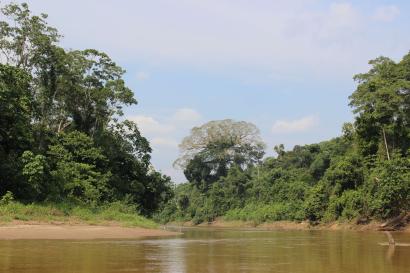Last Sunday brought us, finally, to the Galápagos Islands. We flew to the island of Baltra, then a two hour boat ride took us to Isabela, the largest in the island chain. Sixty miles long and shaped like a seahorse, it boasts a population of three-thousand clustered in a quiet coastal town where you can walk day and night without a care, down the middle of the roads made of soft packed sand. Our Mountain Geology class would spend a week on Isabela studying the lava tunnels, hydrothermal vents, calderas, and other interesting volcanic features of the island. On the last leg of the journey on Sunday, I remembered a conversation I had shortly before leaving for Ecuador:
A wise farmer explained to me why he prefers to plow his land the traditional way, by harnessing horse to plow and driving it across the field, rather than turning to tractors and machinery. His reason was this: there is a sound that the ground makes when you cut into it and churn it up. You might never know it, plowing all the time with a motor running noisily, but he described it to me, the sound of the earth breaking. A remarkably loud ripping and tearing and crumbling, it is the sound of agriculture. The sound of what it is to be human. You feel the strength it takes to carve deep furrows into the ground, the strain of the animal and the resistance of the earth. You smell the soil, dark and rich in the absence of exhaust fumes. It is a different experience entirely, and one that has largely been lost to more efficient technology.
As the motor droned on through our journey to Isabela, I thought that the invention of motorboats probably meant a similar loss for the human experience. I sat on the deck as we sped over the waves, heading west toward the most volcanically-active part of the archipelago. Beyond those bits of land, endless Pacific. Volcanic craters reared their weathered heads above the stretching, otherworldly blue of the sea. I found myself wondering what the soundtrack of our trip would be without the loud white noise that had put most everyone else to sleep. And what had Darwin’s voyage sounded like in 1835 when the Beagle steered for the same basalt shores? I imagined wind against great, flapping sails. Waves against the wooden hull. Quiet. When the sailors neared shore, the squawking of sea birds, and then the occasional barking and splashing of sea lions. Slower sailing would’ve meant more time to contemplate the passing islands, to wonder what other desolate lands lay ahead. Did they develop a sense of dread as they watched a thread of smoke curling from the parched mouth of a looming crater, or the scrubby vegetation bake away in the equatorial sun? They knew that there would be no fresh water anywhere on shore, no one there to greet them but bizarre, indifferent reptiles. It’s no wonder, really, that Darwin wrote of the islands, “Nothing could be less inviting as the first appearance.” There was no comforting motorized hum to be heard back then, just the sound of the sea and the prospect of the strange uncharted territories that lay ahead.
Fortunately, engine noises have not stopped me from listening to the sounds of Isabela: the Sally Lightfoot crabs scuttling along the sharp volcanic rock, the spray of salt water from the nostrils of marine iguanas, the hiss of a steam-spewing sulfur vent. It’s a quiet place, pristine and forever protected, and I think Isabela probably sounds quite like it did when those sailors stepped ashore nearly two-hundred years ago.

Grace Glynn
<p><span style="color: rgb(29, 29, 29); font-family: Arial, Verdana, sans-serif; font-size: 12px; line-height: normal; background-color: rgb(237, 237, 237);">Grace is a junior at Connecticut College with a major in botany. She grew up on the coast of Maine and looks forward to leaving its harsh winter for the equatorial Galapagos Islands. Grace’s interests include paleontology, backpacking, folk music, and fermented foods. Join her as she heads to Ecuador for the semester!</span></p>







